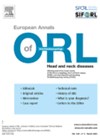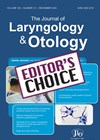
Journal Reviews
Swallowing assessments of the future: the role of artificial intelligence
The future’s bright, the future’s Orange AI… If you Google ‘how much is AI worth?’, the AI overview tells you “The global artificial intelligence (AI) market size is estimated at approximately $244 billion to $391 billion in 2025 and is...
Management of peritonsillar abscesses – should we be offering a hot tonsillectomy?
Peritonsillar abscesses (PTAs) are one of the most common reasons for patients being referred to ENT services on an emergent basis worldwide. The conventional treatment for adult patients with a PTA in the UK involves needle aspiration or incision and...
Laryngocele: a rare but complex disease associated with laryngeal cancer
The incidence of laryngocele is very low – 2.5 per million but its occurrence can be associated with cancer of the larynx. In this retrospective study of 14 cases over 10 years, the authors have elaborated on aetio-pathology, which is...
What factors lead to poor outcomes for children with acute post-intubation laryngeal injuries?
Endotracheal intubation is well known to carry a risk of acute laryngeal injury. These problems range in severity and can lead to chronic problems but, when laryngeal injuries are identified and treated early, there are fewer complications. The authors of...
An otological cure for globus?
Globus pharyngeus is a common benign condition frequently encountered in ENT practice. Laryngopharyngeal reflux and psychological stressors are often considered to be contributory factors, but globus symptoms do not always respond to antacid medications. Such medications can also be limited...
Swallow toxicity score (DIGEST) and its clinical utility in oncology practice
The Dynamic Imaging Grade of Swallowing Toxicity (DIGEST, graded from 0–4) was developed as a tool for clinicians to grade dysphagia from modified barium swallow studies (MBSS). The purpose is to provide a common terminology for adverse events of pharyngeal...
Does frailty lead to changes on quantitative measures of videofluoroscopic swallowing assessment?
In recent years, studies have considered the relationship between frailty and swallowing and demonstrated that decreased skeletal muscle mass correlates with decreased swallowing function. This study investigated this relationship by using quantitative measurement of three individual components of swallowing assessed...
The use of 3D videos to improve patient engagement with compensatory swallowing strategies
Patients with dysphagia are often asked to use compensatory techniques or manoeuvres to facilitate safe swallowing. For example, they may be taught to do a supraglottic swallow to minimise aspiration or a specific postural adjustment to support bolus flow. These...
Tonsillectomy and the environment
The authors compared the carbon footprint of various techniques used for subtotal tonsillectomy. The techniques included radiofrequency ablation, coblation and cold steel with bipolar diathermy. All medical equipment was reported and their carbon emissions in eCO₂ calculated. Cold steel with...
Globus, reflux or perhaps both?
We rarely do an ENT clinic without encountering a patient with persistent or recurring feeling of a lump or foreign body in the throat. We are also familiar with patients dreading to hear the C word after the endoscopic examination...
A faster way to manage patients with swallowing disorders with enhanced role of speech and language therapists
Allied health professionals (AHPs) make up the third largest clinical workforce in the NHS. They represent a diverse group of registered professions who play a vital role in the health service, working across various settings and with all age groups....
Chin up, doc! A few simple manoeuvres could make all the difference in FNE
Flexible nasendoscopy (FNE) is an ENT surgeon’s bread and butter. It is integral and often considered superior to conventional radiography in the assessment of laryngeal and pharyngeal cancers. However, it is not as simple as sticking the camera in and...















